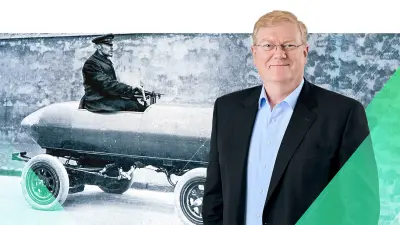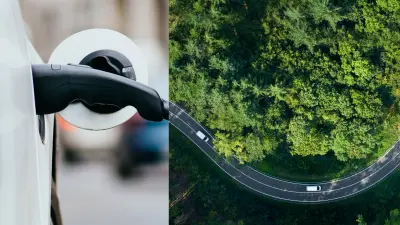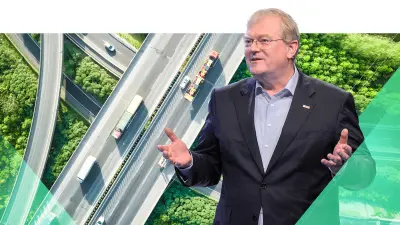More incentive, less coercion
Why simply wagging a finger will do nothing for climate action

2023-10-25
They called him the Red Devil. In 1899, the Belgian race car driver Camille Jenatzy became the first motorist ever to break 100 kilometers per hour — with his red goatee blowing in the wind, in a car like a steel cigar on four wheels. But the reason I mention Monsieur Jenatzy’s achievement here is not that he featured in advertisements for Bosch, but because he gave his vehicle a name that neatly sums up the essence of mobility. He called it La Jamais Contente — “The Never Contented.”
by Stefan Hartung
Over the millennia, few things have unleashed as much power as the human quest for change. This has found its expression in mobility — not only across physical distances, but also intellectually. Ask anyone what the most important inventions are, and they will mention the wheel, the boat, the steam engine, and of course the car — all of them things that have directly facilitated our locomotion. Other key innovations have brought mobility not to people, but to knowledge and information: writing, the invention of printing with movable (!) type, radio, and of course the internet.
The gradual conquest of distance through technology is the very foundation of our modern world. Today, however, it seems we have somewhat lost sight of this fundamental and vital aspect of mobility. In light of the epoch-making challenge posed by climate change, individual mobility is often simply disparaged, with ideological fervor sometimes displacing any regard for economic, technical, and social facts.

At the same time, hardly anyone disputes that climate change is making it imperative to create a new form of mobility that is sustainable and emissions-free. The efforts currently being made by large swathes of the economy and society to achieve this green transformation are considerable, in some cases even bordering on the unaffordable. And yet the calls for bans and restrictions are becoming increasingly louder and more extreme. Above all, however, the focus of attention has long since widened to include more than mobility: in the name of climate action, more and more everyday behaviors, from what we eat to how we travel, are being not just questioned but also rejected.
As a result, the debate about how to combat climate change is becoming increasingly ideological. Such a development bodes ill for both the environment and for democracy. A recent study by Dresden University entitled “Polarization in Germany and Europe” showed that hardly any other topic can spark such strong waves of outrage as climate change. Any difference of opinion on this subject, no matter how minor, is taken personally more quickly than in the case of many other current controversial issues.
I find this worrisome. It is precisely these highly emotionally charged topics that create a breeding ground for populism. Those who let themselves be guided by feelings instead of facts usually run to wherever the shouting is loudest. This is annoying in many debates, but in the case of climate change, it is particularly fatal. For example, if a minority of activists believe that the only way they can stop climate change is by gluing themselves to the roads, the main effect will be for large sections of the population to increasingly associate the issue with discontent, stagnation, and confrontation — and not with the willingness to change that is actually needed.
However, there is also a dangerous tendency to emotionalize among those who consider climate change to be a new-fangled fad. Nostalgia is as paralyzing as ideology. Especially since it should be clear that, in the long run, the only way we can afford mobility without restrictions — and thus a free society — is if it has no negative impact on our ecosystem. In other words, we don’t just need sustainable mobility because we want to act in an environmentally friendly and climate-conscious way, but also so that we can continue to shape our lives individually and independently in the future. After all, it’s not just necessity that drives us to move around, but also curiosity. Because we have an innate desire for growth and prosperity. Because we want to be free and independent. Simply put, because we are never satisfied — jamais contente.

Those who forget this will not be able to win support for climate action. A sustainable economy is not created by fiat or by wishful thinking, but through investment. Investment in our infrastructure, in our education system, in our technology. Governments, business, and society must all pull together to achieve this. If we at Bosch, for example, develop new software that can cut the battery charging time for electric cars by 20 percent, that will help the climate only if there is enough green electricity to go around. And only if people have enough money to afford modern technologies.
That’s a challenging goal. One that a society divided against itself cannot achieve. So we should stop wagging fingers and return to a factual, unbiased debate. The agenda must not be set by fear-mongers and ideologues. Instead, it needs broad consensus. For climate action to succeed, we must approach the challenges we face with more openness, curiosity, and above all, confidence. Just like Camille Jenatzy, who fearlessly squeezed into his silver racing “cigar” — which, by the way, was battery powered — and set a whole new pace. Only those who think in terms of visions rather than prohibitions can truly be ahead of their time.
This article was first published in German in the newspaper WELT.


